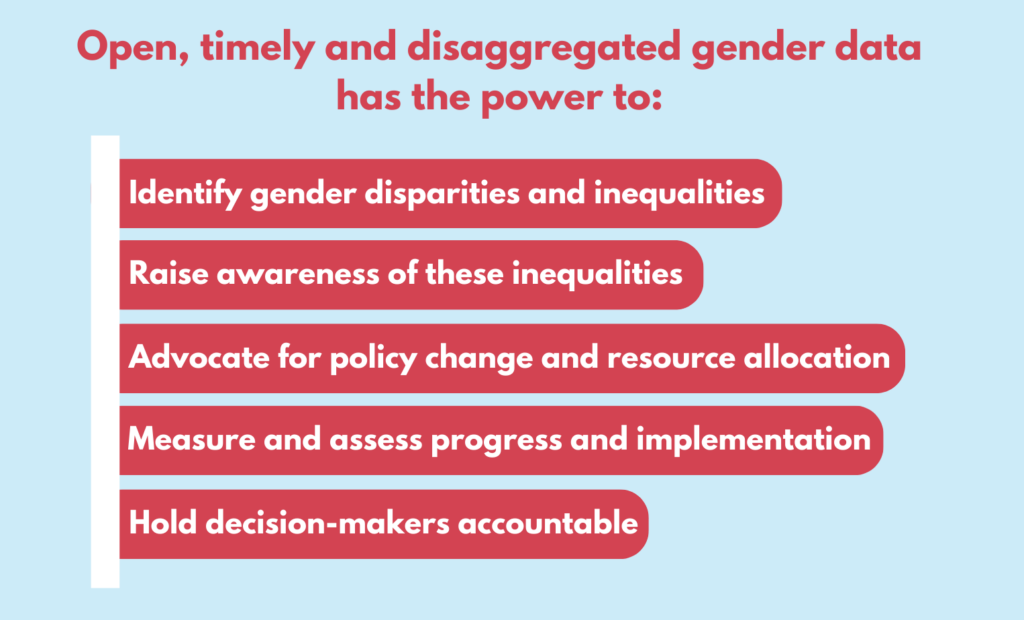16 Days of Activism: The power of investing in data-driven advocacy to combat gender-based violence (GBV)
How are organizations across the Equal Measures 2030 coalition using data to prevent and tackle gender-based violence (GBV)?
Written by Esme Abbott, Communications Lead, Equal Measures 2030
In 2021, more than 5 women or girls were killed every hour by someone in their family, and 1 in 3 women have already experienced some form of physical or sexual violence. These staggering figures have been critical in calling attention to the wide-spread prevalence of gender-based violence and demanding action. For the 16 Days of Activism Against Gender-Based Violence, we want to highlight how Equal Measures 2030’s coalition members are harnessing the power of data and evidence to tackle gender-based violence and how others can too.

What does this look like in practice across our coalition?
Whilst gender-based violence impacts every woman and girl, either directly or indirectly, stigma, shame and fear often obscure it from mainstream conversations. Promoting discussions online, in communities and in policy-making spaces is paramount in demanding justice, both through calling for legal frameworks and by providing women with the support networks and information needed to seek justice when they face GBV.
In Senegal, Réseau Siggil Jigéen has led multiple digital campaigns to draw the attention of decision-makers, technical and financial partners and civil society to the urgent need for effective initiatives to eradicate GBV using data. ARROW, in the Asia-Pacific region, also use data in their advocacy campaigns to end GBV and their #CSE4ALL advocacy campaign which engaged with young people to demand inclusive, evidence-based Comprehensive Sexuality Education (CSE) for all.
They have also used data-driven advocacy to highlight the issue of FGM/C at various international platforms including ASEAN and Women Deliver, and co-launched the Asia Network to End FGM/C bringing together activists, civil society organisations, survivors, researchers, medical professionals, journalists and religious leaders to promote the abandonment of all forms of FGM/C across the Asia region.
SAHAJ, a Civil Society Organisation (CSO) in India, has taken a community-centric approach, identifying GBV cases, implementing primary interventions and mapping out support and referral systems. To ensure the work continues, they’ve engaged with local youth and community leaders to understand their knowledge and practices, and familiarising the leaders with the support and referral systems; as well as working with support groups to extend awareness and preventive measures deeper into the community.
Similarly, GROOTS Kenya has trained grassroot responders in the community on GBV. These responders not only intervene in GBV cases but also collect data, which is used to raise awareness and advocate for collaborative efforts to address the issue. By highlighting the high levels of GBV in their communities, they have secured funding for sensitization and awareness initiatives, empowering communities to identify and address GBV cases. And in Latin America and the Caribbean, CLADEM has heightened awareness of forced child pregnancies, femicide, and sexual violence against girls and adolescents through annual Diploma Courses.
To empower women’s organisations and CSOs to undertake this work effectively, and to ensure the necessary referral systems and legal frameworks are in place, advocating against GBV in political decision-making spaces is essential. CLADEM has actively engaged in the evaluation of the Belém do Pará Convention, submitting national reports and participating in expert hearings to present data and evidence on women’s access to justice in cases of sexual violence and child marriage in the LAC region.

Demanding accountability and action with gender data
Gender data is vital for understanding the prevalence, forms, and drivers of gender-based violence, illuminating the root causes and the ways in which violence is intensified at the intersection of various identities and contexts. The power of gender data extends beyond merely highlighting the issue; it demands accountability and drives action. Once we know where the problem is and can provide decision-makers with the concrete evidence they seek, gender data can inform the design and implementation of interventions, ensuring they are effectively implemented and sufficiently funded.
Through their data-driven advocacy, ASOGEN in Guatemala, has influenced decisions at the national and local levels, to prevent violence against women and promote their human rights. They have fought to increase budgets for the country’s network of shelters protecting women and girls against GBV, including recently securing government funds for the CAIMUS Centers that support women survivors of violence in the departments of Chimaltenango and Sacatepéquez. Moreover, they’ve secured a commitment to implement a technical working group for the prevention of violence against women in Sacatepéquez, ensuring this issue remains on the agenda.
It’s not only crucial to establish these policies and programmes, but also to ensure they are implemented effectively, leading to tangible change. Previously, the advocacy work of KAPAL Perempuan, and its partners in Indonesia successfully advocated for the Indonesian parliament to raise the legal marriage age for girls from 16 to 19 years, aligning it with that for boys. This significant legal victory enables teenage girls to continue their secondary education, have more control over their lives, and reduces the risk of sexual, physical, and psychological harm associated with child marriages.
But advocacy work cannot stop at this win. Since then, KAPAL has been collecting data on instances of child marriage and marriage dispensation in religious courts from 2020-2023. The data showed a growing trend in child marriage and marriage dispensation during the pandemic. KAPAL has been utilising data-driven advocacy to engage with local stakeholders in each province to co-create and implement child marriage prevention and response strategies and plans.

Gender-based violence escalates during crises, as KAPAL observed during the COVID-19 pandemic, and in times of conflict as seen in Colombia where a history of armed conflict has significantly impacted women’s rights, including their right to live free from violence, their livelihoods and those of their families and communities. La Ruta Pacifica in Colombia has been monitoring the implementation of the gender measures in the Peace Agreement, raising awareness on the slow progress. Their work to strengthen the peace efforts is fundamental to break the continuum of violence against women and girls and protect their human rights.
The work of the organisations in our coalition demonstrates how data-driven advocacy leads to substantial change, from influencing policy decisions to implementing programmes that protect women and girls from violence. It is crucial that investments to combat gender-based violence include investments in timely gender-disaggregated data to ensure we can identify patterns of violence, evaluate the efficacy of solutions and guide investments and policies to ensure they bring about genuine progress.



